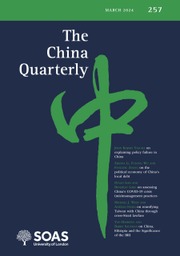Politicizing Business
The Chinese Communist Party has always been ambivalent about how to treat the private sector of the economy. Professor Leng's superb study provides us with a nuanced view of this complicated relationship. Using detailed case studies (the urban bus sector and waste management) she demonstrates convincingly how the authoritarian political economy leads to the politicization of business. Businesses are seen as providing career support to individual officials through visibility projects and providing systemic support aiding social control. Far from outcomes being solely attributable to Xi Jinping's or any central leader's approach, she demonstrates how government–business relations are driven by the incentive system under which local officials operate. The book is a must-read, not only for those interested in government–business relations but also for those who seek a deeper, more nuanced understanding of China's political economy.
- Provides readers a new framework to understand China's economic slowdown, unstable investment environment, dominance of state-owned enterprises, prevalence of wasteful infrastructure, and unsustainable development—phenomena widely debated within and beyond academia
- Provides a relatable concept to understand government behavior that readers can apply to many contexts beyond China and infrastructure building
- Incorporates exceptionally rich empirical data, including interviews of rare scale and depth, as well as two original datasets and statistical analysis
Reviews & endorsements
‘The Chinese Communist Party has always been ambivalent about how to treat the private sector of the economy. Professor Leng’s superb study provides us with a nuanced view of this complicated relationship. Using detailed case studies (the urban bus sector and waste-water management) she demonstrates convincingly how the authoritarian political economy leads to the politicization of business. Businesses are seen as providing carer support to individual officials through visibility projects and providing systemic support aiding social control. Far from outcomes being solely attributable to Xi Jinping’s or any central leader’s approach, she demonstrates how government–business relations are driven by the incentive system under which local officials operate. The book is a must-read, not only for those interested in government–business relations but also for those who seek a deeper, more nuanced understanding of China’s political economy.’ Tony Saich, Daewoo Professor of International Affairs, Harvard Kennedy School
‘For all the undeniable successes of China’s economic model, Ning Leng’s excellent new book reminds us of the fragility of business-state relations by exploring variation in state encroachment in two vital sectors in convincing detail. Deeply researched and clearly argued, Politicizing Business is a major contribution.’ Tim Frye, Marshall D. Shulman Professor of Post-Soviet Politics, Columbia University
‘Professor Ning Leng has written a timely book. The central phenomenon she tackled - the phenomenon of visibility projects - is a salient feature of the Chinese economy and yet there is almost no detailed scholarly treatment of the topic. Her book delves into and unpacks this issue, and it will enhance our understanding of China in important ways.’ Yasheng Huang, Epoch Foundation Professor of Global Economics and Management, MIT Sloan School of Management
‘This is a powerful account of the politicization of business in contemporary China and its institutional roots. In China’s political economy, where no firm is protected from encroachments of the state, Leng illuminates how and why private firms lose to state firms in the competition to meet demands for political goods and services. Leng makes her arguments with vivid case studies and material from hundreds of interviews conducted in years of fieldwork in fifteen cities. This is an important contribution to our understanding of the business–government relationship under authoritarianism.’ Melanie Manion, Vor Broker Family Distinguished Professor of Political Science, Duke University
Product details
September 2025Hardback
9781009662291
200 pages
228 × 152 mm
Not yet published - available from September 2025
Table of Contents
- 1. The Hidden Political Roles of Firms in China
- 2. Visibility Projects, the First Political Service
- 3. Societal Control, the Second Political Service
- 4. Visibility Projects and the End of Marketization in China's Urban Bus Sector: National Trend
- 5. How Visibility Projects Ended Marketization in the Urban Bus Sector: a Tale of Two Cities
- 6. Protests, Societal Control, and Firms in the Solid Waste Treatment Sector: National Landscape
- 7. How Protests Change the Relationship Between the State and Firms: Another Tale of Two Cities
- 8. Reflections on China's Political Economy Model and Sustainable Development.










